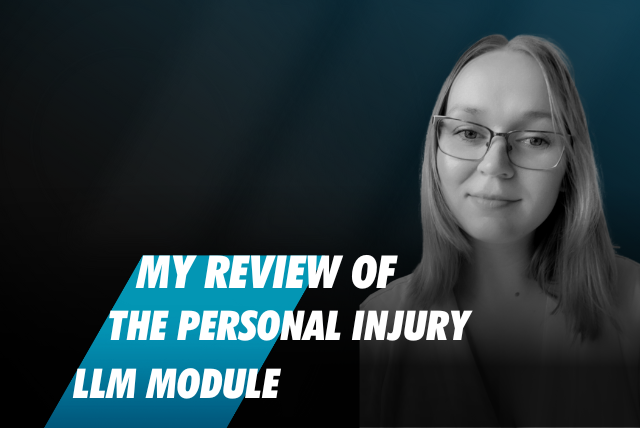Written by Mary Brunt, LLM in Legal Practice Student at The College of Legal Practice
In this article, I’ve shared my honest experiences and reflections on studying this module in hopes of it helping future students understand what is involved in the module and what studying at the College is like.
Course Summary
Starting with an overview of the course in terms of structure each week featured a new sub-topic but followed the same format:
- Resources: This is where all the reading material and links are for you to study the topic being taught that week
- Instructions: This was usually an email from a partner asking you to prepare a legal document. There were often other documents enclosed such as emails from a client or expert report etc. The work needed to be submitted each Wednesday by midnight
- Feedback: Every Friday you have a one-to-one meeting with your supervisor who provides feedback on your work and you have the opportunity to discuss and ask any questions.
Assessments
The work you submit each week is not graded and does not count toward your final mark.
Portfolio: Once you've had your feedback meeting on a Friday, you need to amend the piece of work to reflect the feedback received. At the end of the module, all of the amended work is collated into a portfolio and submitted, this counts for 60% of your grade.
Reflection: You also have to write a 1500-word reflection that goes over each task and provides a personal reflection on what went well and what maybe didn't go so well. You should write about why you chose the module, what you wanted to gain from it, and whether this has been achieved. You also need to identify any areas where you still need further study/research to improve your understanding. This counts for 20% of your grade.
Oral Assessment: Finally, you have an oral assessment. This is a 20-minute interview with your supervisor. Your supervisor will choose two tasks and ask you to talk through the process you went through in preparing it, key considerations, the next steps to be taken, and any commercial considerations. This counts for the final 20% of your grade.
My Views
This module was much less work than what is needed for the SQE preparation modules and so it initially felt like it wasn't very much. This is normal and to be expected as the SQE modules are incredibly intense as they need to be, in order to properly prepare you for the actual assessments!
I have worked as a personal injury paralegal for almost 4 years so I was already quite familiar with the key stages in a case and as a result, my experience of the course may be different to others.
I found the reading to be comprehensive, easy to understand and to the point. I liked that everything was linked so it was easy to click through to Westlaw and find what I needed.
I loved that the tasks were based on a variety of mock cases, which really helped to show how the law works in practice and give the student a taste of what it's like to work in personal injury law. I do think students who have never practiced personal injury before may struggle to draft some of the legal documents having never seen similar documents before.
The feedback sessions are by far the most valuable part of the course as you have one-to-one tailored feedback and advice from a practicing lawyer in this area of law. I was able to ask detailed questions and have had some brilliant advice that I will take with me into practice.
--------------------------------------------------------------------------------
To stay up to date with the journey of our LLM student Mary Brunt, follow them on Instagram at SQE.with.me
Interested in our LLM in Legal Practice?
Costs for our LLM in Legal Practice (which includes our SQE1 and SQE2 prep courses) can be covered by a postgraduate Master's Loan and is available to study as a one-year, two-year, or up to a 4-year programme.
Enjoying our student content?
Want to check out what our other students have said about other courses? Check out our student, Dan's, review of the Dispute Resolution module

